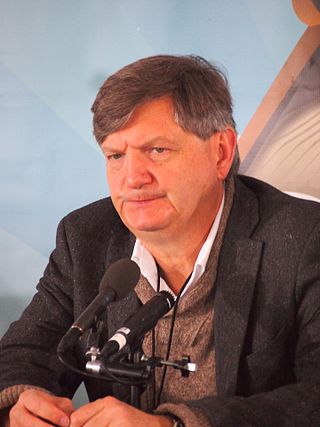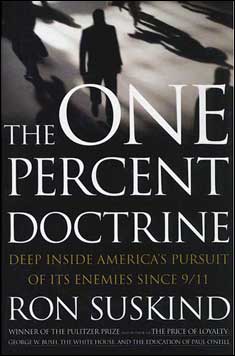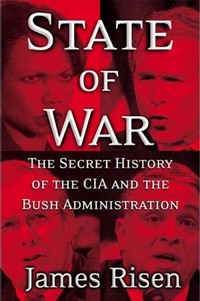
Iraq actively researched and employed weapons of mass destruction (WMD) from 1962 to 1991, after which it destroyed its chemical weapons stockpile and halted its biological and nuclear weapon programs as required by the United Nations Security Council. The fifth president of Iraq, Saddam Hussein, was internationally condemned for his use of chemical weapons against Kurdish civilians and military targets during the Iran–Iraq War. Saddam pursued an extensive biological weapons program and a nuclear weapons program, though no nuclear bomb was built. After the Gulf War, the United Nations located and destroyed large quantities of Iraqi chemical weapons and related equipment and materials; Iraq ceased its chemical, biological and nuclear programs.

George John Tenet is an American intelligence official and academic who served as the Director of Central Intelligence (DCI) for the United States Central Intelligence Agency, as well as a Distinguished Professor in the Practice of Diplomacy at Georgetown University.

Iran and the United States have had no formal diplomatic relations since 7 April 1980. Instead, Pakistan serves as Iran's protecting power in the United States, while Switzerland serves as the United States' protecting power in Iran. Contacts are carried out through the Iranian Interests Section of the Pakistani Embassy in Washington, D.C., and the US Interests Section of the Swiss Embassy in Tehran. In August 2018, Supreme Leader of Iran Ali Khamenei banned direct talks with the United States.

Seymour Myron Hersh is an American investigative journalist and political writer. He gained recognition in 1969 for exposing the My Lai massacre and its cover-up during the Vietnam War, for which he received the 1970 Pulitzer Prize for International Reporting. During the 1970s, Hersh covered the Watergate scandal for The New York Times, also reporting on the secret U.S. bombing of Cambodia and the Central Intelligence Agency's (CIA) program of domestic spying. In 2004, he detailed the U.S. military's torture and abuse of prisoners at Abu Ghraib in Iraq for The New Yorker. Hersh has won five George Polk Awards, and two National Magazine Awards. He is the author of 11 books, including The Price of Power: Kissinger in the Nixon White House (1983), an account of the career of Henry Kissinger which won the National Book Critics Circle Award.

The Director of Central Intelligence (DCI) was the head of the American Central Intelligence Agency from 1946 to 2004, acting as the principal intelligence advisor to the president of the United States and the United States National Security Council, as well as the coordinator of intelligence activities among and between the various US intelligence agencies.

Joseph Cofer Black is an American former CIA officer who served as director of the Counterterrorism Center in the years surrounding the September 11th attacks, and was later appointed Ambassador-at-Large and Coordinator for Counterterrorism at the State Department by President George W. Bush, serving until his resignation in 2004. Prior to his roles combatting terrorism, Black served across the globe in a variety of roles with the Directorate of Operations at the CIA.
Blowback is the unintended consequences and unwanted side-effects of a covert operation. To the civilians suffering the blowback of covert operations, the effect typically manifests itself as "random" acts of political violence without a discernible, direct cause; because the public—in whose name the intelligence agency acted—are unaware of the effected secret attacks that provoked revenge (counter-attack) against them.

James Risen is an American journalist for The Intercept. He previously worked for The New York Times and before that for Los Angeles Times. He has written or co-written many articles concerning U.S. government activities and is the author or co-author of two books about the Central Intelligence Agency (CIA) and a book about the American public debate about abortion. Risen is a Pulitzer Prize winner.

William Joseph Burns is an American diplomat and the director of the Central Intelligence Agency (CIA) during the Biden administration since March 19, 2021. He previously served as U.S. deputy secretary of state from 2011 to 2014; in 2009 he served as acting secretary of state for a day, prior to the confirmation of Hillary Clinton. Burns retired from the U.S. Foreign Service in 2014 after a 32-year career. From 2014 to 2021, he served as president of the Carnegie Endowment for International Peace.

The Central Intelligence Agency, known informally as the Agency, metonymously as Langley and historically as the Company, is a civilian foreign intelligence service of the federal government of the United States tasked with gathering, processing, and analyzing national security information from around the world, primarily through the use of human intelligence (HUMINT) and conducting covert action through its Directorate of Operations. The agency is headquartered in the George Bush Center for Intelligence in Langley, Virginia.

The One Percent Doctrine (ISBN 0-7432-7109-2) is a nonfiction book by Pulitzer Prize–winning journalist Ron Suskind about America's hunt for terrorists since September 11, 2001. On July 24, 2006, it reached number 3 on the New York Times Best Seller list.

David Albright, M.Sc., is an American physicist and a weapons expert who is the founder of the non-governmental Institute for Science and International Security (ISIS), its current president, and author of several books on proliferation of atomic weapons.

United States support for Ba'athist Iraq during the Iran–Iraq War, in which it fought against post-revolutionary Iran, included several billion dollars' worth of economic aid, the sale of dual-use technology, military intelligence, and special operations training. The U.S. refused to sell arms to Iraq directly due to Iraq's ties to Palestinian groups which the U.S. designates as terrorist organizations such as the Palestinian Liberation Front and Abu Nidal Organization, but several sales of "dual-use" technology have been documented; notably, Iraq purchased 45 Bell helicopters for $200 million in 1985. Of particular interest for contemporary Iran–United States relations are accusations that the U.S. government actively encouraged Iraqi leader Saddam Hussein to invade Iran, supported by a considerable amount of evidence and generally regarded as the conventional wisdom in the Arab world, but several scholars and former U.S. government officials deny that any such collusion occurred, and no direct documentary proof of it has been found.
This is the timeline of the nuclear program of Iran.
The Central Intelligence Agency (CIA) has repeatedly intervened in the internal affairs of Iran, from the Mosaddegh coup of 1953 to the present day. The CIA is said to have collaborated with the last Shah, Mohammad Reza Pahlavi. Its personnel may have been involved in the Iran-Contra affair of the 1980s. More recently in 2007-8 CIA operatives were claimed to be supporting the Sunni terrorist group Jundallah against Iran, but these claims were refuted by a later investigation.
The Barack Obama administration's involvement in the Middle East was greatly varied between the region's various countries. Some nations, such as Libya and Syria, were the subject of offensive action at the hands of the Obama administration, while nations such as Bahrain and Saudi Arabia received arms deliveries. Notable achievements of the administration include inhibiting the Iranian nuclear program, while his handling of certain situations, such as the Syrian civil war, were highly criticized.

State of War: The Secret History of the CIA and the Bush Administration is documentary review written by Pulitzer Prize-winning American journalist for The New York Times James Risen. The book was released on January 3, 2006.

Jeffrey Alexander Sterling is an American lawyer and former CIA employee who was arrested, charged, and convicted of violating the Espionage Act for revealing details about Operation Merlin to journalist James Risen. Sterling claimed he was prosecuted as punishment for filing a race discrimination lawsuit against the CIA. The case was based on what the judge called "very powerful circumstantial evidence." In May 2015, Sterling was sentenced to 3½ years in prison. In 2016 and 2017, he filed complaints and wrote letters regarding mistreatment, lack of medical treatment for life-threatening conditions, and false allegations against him by corrections officers leading to further punitive measures. He was released from prison in January 2018.
Operation Olympic Games was an ostensible and still unacknowledged campaign of sabotage by means of cyber disruption, directed at Iranian nuclear facilities likely by the United States and Israel. As reported, it is one of the first known uses of offensive cyber weapons. Started under the administration of George W. Bush in 2006, Olympic Games was accelerated under President Obama, who heeded Bush's advice to continue cyber attacks on the Iranian nuclear facility at Natanz. Bush believed that the strategy was the only way to prevent an Israeli conventional strike on Iranian nuclear facilities.

The Joint Comprehensive Plan of Action, more commonly known as the Iran nuclear deal, was the international agreement reached on Iran's nuclear program in Vienna in 2015. The deal, made after several years of negotiation, set in place strict guidelines to regulate and oversee the Iranian nuclear program including the reduction of centrifuges, enriched uranium stockpiles, and an agreement to allow regular inspections of nuclear sites, among other aspects. The deal has attracted enormous criticism by certain political and media elements in the United States and Iran as the deal is viewed as conciliatory in nature by some factions in both countries. For example, President Donald J. Trump called the Iran deal, "the worst deal ever negotiated" and United States Senate Majority Leader Mitch McConnell characterized it as "flawed", while hardliners in Iran have indicated a desire to subvert it. Much of the criticism in the United States has been centered on the issue of appeasement and Iran's compliance, while in Iran many of the criticisms revolve around the issue of sovereignty and non-nuclear restrictions.















